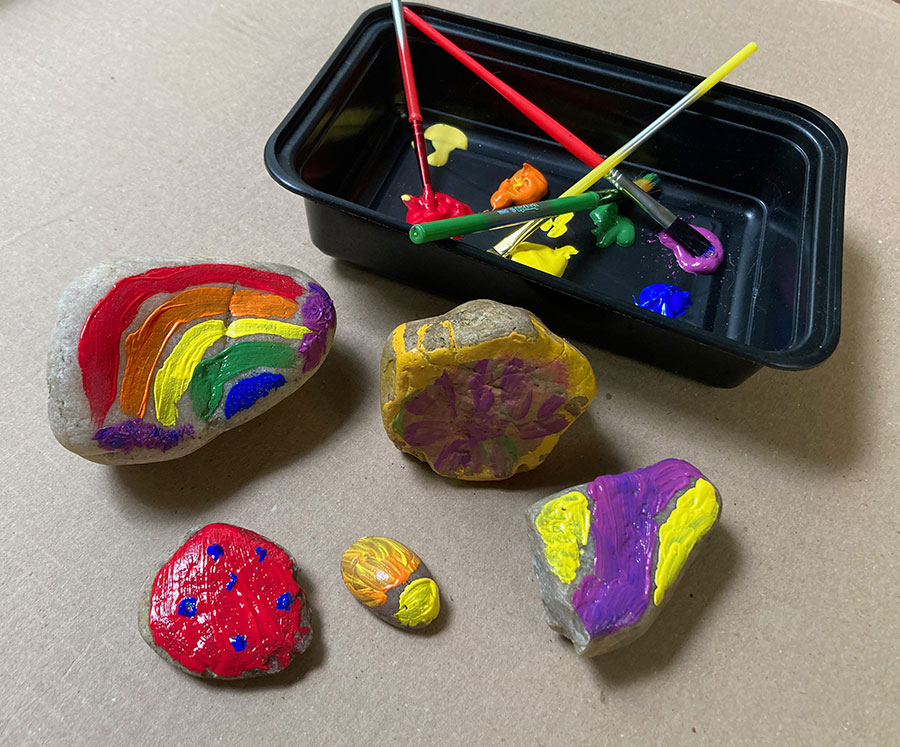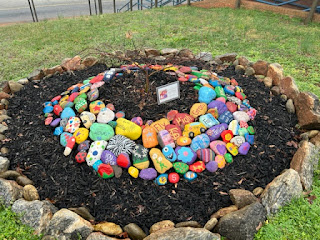I was so intrigued by the project that I did a little more research and found this fabulous website:
Click here to visit Kids Gardening
Just think how you could adapt this to an end of year project. The children could paint rocks with their names, kind words, a welcome message, etc. You could even make a letter garden where children choose a letter, sight word, or other skill and paint a rock.
Hint! Rocks can also be a bridge to talking about diversity. Go on a rock hunt and let each child find a rock. Have the children sit in a circle and take turns describing their rocks and passing them around for other to hold. How their rocks alike? How are they different? How are people alike? How are they different? Wouldn't it be a boring world if all the rocks and people looked exactly the same?
Here's some background information from kidsgardening.org:
The American Journal of Public Health published a literature review on The Connection Between Art, Healing and Public Health examining the health benefits of visual arts therapy, movement-based creative expression, and expressive writing. The Children and Nature Network’s Research Library is full of studies looking at the social and emotional benefits of spending time in nature. What if you combine the two by engaging in creative activities that encourage self-expression in a natural setting?
In an ideal youth garden setting, kids would have the opportunity to help design the garden and select the plants and special features included. However, when there are a large number of kids utilizing a garden (such as at a school or public space), this level of involvement can be challenging due to cost and available space. Educators can turn to simpler crafts using inexpensive or repurposed materials as an alternative for allowing students to help decorate the garden space and make it their own. This lesson lays out ideas for using painted rocks in your garden to allow young gardeners to express themselves, to communicate with each other, and to contribute to the garden in a personal way.

The American Journal of Public Health published a literature review on The Connection Between Art, Healing and Public Health examining the health benefits of visual arts therapy, movement-based creative expression, and expressive writing. The Children and Nature Network’s Research Library is full of studies looking at the social and emotional benefits of spending time in nature. What if you combine the two by engaging in creative activities that encourage self-expression in a natural setting?
In an ideal youth garden setting, kids would have the opportunity to help design the garden and select the plants and special features included. However, when there are a large number of kids utilizing a garden (such as at a school or public space), this level of involvement can be challenging due to cost and available space. Educators can turn to simpler crafts using inexpensive or repurposed materials as an alternative for allowing students to help decorate the garden space and make it their own. This lesson lays out ideas for using painted rocks in your garden to allow young gardeners to express themselves, to communicate with each other, and to contribute to the garden in a personal way.

Note! They stressed the importance of working together to create guidelines so it's a positive experience for everyone.
*Acrylic paints/pens and sealant were recommended.
Branching Out
Use KidsGardening’s Growing Poems lesson to encourage more ways of using the garden as inspiration for self-expression.
Check out the Kindness in the Garden lesson for more ideas for incorporating kind acts in garden spaces. Additional ideas can be found through the Compassion Flower Project developed in partnership with Mrs. Meyer’s Clean Day.


